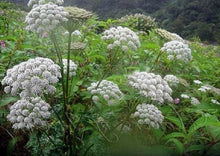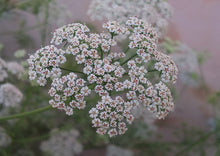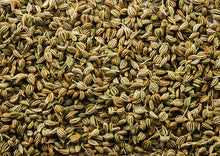Carom seeds (aka Ajwain) belong to the cumin family, Apiaceae. This plant is predominantly found in the regions of India and used as a spice. Carom seeds are egg-shaped and tan coloured. Though by appearance, it looks like thyme, carom seed is more aromatic, bitter and pungent.
Carom seeds are exceptionally flavorful and dominates the flavour of the dish.
Other names for carom seeds are
English – Carom seeds, Bishop’s weed
Indian – Ajwain, Ajovain (Carom Seeds In Hindi )
German – Ajowan Samen
French – Ajowan , Carambole graines
Spanish – Semillas de carambola
Growing
Carom seeds (Trachy spermumammi) belong to the family of Apiaceae (Umbelliferae), of the genus; Trachyspermum. The Umbellifers are the members of carrot or parsley family, is an annual herbal plant growing up to 2 feet in height.
Planting
- Start seeds indoors about 8–9 weeks prior to last spring frost date. Seeds germinate quickly at temperatures between 70 to 80°F.
- Do not plant transplant into the garden until after the last threat of frost.
Sunlight: Full sun to partial shade is favorable for Carom plant. The true color of its leaves is jade green, but in absence of ample sunlight, they turn dark green shade. For indoors, this plant will be benefited from west to south-facing windows.
Water: Carom plant appreciates slightly moist soil, but not soggy. Water it during the early morning or evening.
Soil: Carom plant prefers loose, well-aerated, and well-draining soil with a pH around 6-8. If growing in the garden, amend the soil fertility with compost or any organic matter. For pots, it is better to use a potting mix. You can make your own mix by mixing equal parts of compost or well-rotted manure, coarse sand, and peat moss.
Pot: Choose a pot that’s at least 12-inches deep and wide. Make sure the pot has at least one drainage hole at the bottom to let excess water skip.
Pests / Diseases
Carom plant is generally not damaged by pests and cabbage worms, in fact, it deters them away. But it can be susceptible to aphids, and bug attacks, so you can use a neem oil spray. And, don’t forget to remove infected parts immediately.
Harvest
Both flower and leaves find culinary uses in the kitchen and are available for harvest after 6-7 weeks. You can snip off fresh leaves, before they start to develop bristly hairs, using scissors. The flower can be hand-picked when they are opening. You can use leaves and flowers fresh in cooking or making tea.
Click here to download our free vegetable growing guide
Indian vegetable seeds; Best indian vegetable seeds in USA; Top vegetable seeds for USA climate; Organic vegetable seeds India; High yield vegetable seeds India; Popular vegetable seeds in India, Heirloom Indian vegetable seeds USA; Vegetable seeds for home gardening USA; Traditional Indian vegetable seeds; Non-GMO vegetable seeds USA; Vegetable seeds for balcony gardening India; High-quality indian vegetable seeds USA; Vegetable seeds for urban farming USA; Seed companies in India; Best vegetable seeds for Indian kitchen garden; Fast-growing vegetable seeds India; Vegetable seeds for all seasons India; Best vegetable seeds for hydroponic gardening India; Vegetable seeds for beginner gardeners India and USA; Rare vegetable seeds India; Affordable vegetable seeds India; Imported vegetable seeds India; Native Indian vegetable seeds; Open-pollinated vegetable seeds India.






